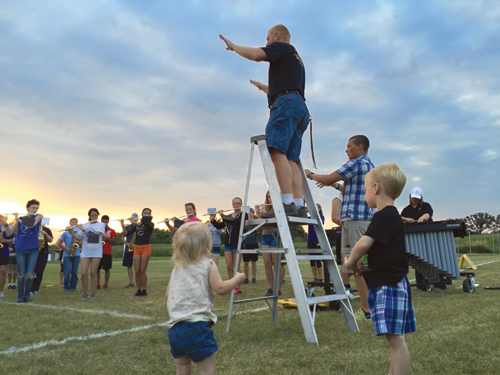
As a high school band director, a husband and father of four, I find it difficult to keep up with my work obligations as well as my family. It is hard to find that working balance between the two lives. Providing a high-quality musical experience for my students while being a good husband and father is essential. Here are some suggestions, based on research done for a master’s project, as to what any director can do to help any director find a better balance.
1. Keep a paper or digital planner to put in daily appointments and schedule. I find that this helps throughout the year as I plan for both school as well as my family. With that daily planner, schedule time for the family and put the family obligations and schedule in the calendar first. Keep those appointments.
Then schedule as many of the school events around the family events. Consider scheduling a date night with the spouse or kids. Put that date night into the planner and guard that date from any other event. I try to take each of my kids out for lunch or breakfast once in a while. Each of the kids gets their own day and chooses where we are going.
2. Plan each day ahead of time. Many times, directors have students in their rooms after school hours. By arriving at school early and completing administrative tasks before students arrive, we will accomplish more during the day. Additionally, schedule a specific time to leave each day. It’s easy to get involved in a project and lose track of time. Pretty soon it is five o’clock and we haven’t gone home. A cell phone alarm can make a good reminder to shut things down and head out the door.
3. Delegate responsibilities. Students can complete many tasks that are often done by directors. Assign jobs to specific students. One student or a small group of students can manage the music library. Their job is to get music ready to go out and then refile it later. Another student or group straightens up the room. Another student might take attendance and contact absent students. Yet another student could direct publicity for the program. They could contact the newspaper to advertise for the performances, send out invitations to the school board, design the program.
4. If possible, split a stipend with a second director to share some of the extracurricular responsibilities. Teaching music does not run from 7:45 to 3:30. Many of the hours are taken up with basketball and football games and concerts. If there is an assistant director in the district, consider splitting the extra responsibilities to get more time at home.
5. Establish limits for extra performances or events. When scheduling different events, refer back to the priorities that were already set. It is okay to tell someone that the ensemble is unable to perform at a function. When setting priorities, divide things up into different categories: work goals, necessities at home, and any leisure activities. Then develop a plan to balance these priorities. Keep a time log to determine if a balance between each of the different categories is being achieved.
It is equally important to share these priorities with family and administration. When a decision must be made to eliminate an activity from the schedule, it will be much easier to justify that decision if everyone shares the same priorities.
6. Learn to say no. There are plenty of times that the ensemble is out performing, so saying no once in a while is okay. If the no comes with an explanation, the recipient is more tolerant.
7. Do not take work home. It is essential to spend undivided time with your family. We spend a good deal of time working on school work while at home. The work will still be there in the morning. Another difficult time to leave is immediately following a performance. As a high school director, I spend a lot of time waiting for the students to get picked up. If parents know when they should be there to get their child, most likely they will be there on time. Getting the students out the door as quickly as possible allows me to get home.
8. Technology has made it much easier to stay in touch with work than it has for spending time with the family. I suggest taking school email off the phone, which allows us to escape from work and undistracted time with the family. I remember one weekend trip I took to Wisconsin Dells that my family took. While we were there, I took a glanced at my school email on my phone, even though I was on vacation. There was an email from my principal to call him. I spent the next half an hour wondering what was going on and talking with the principal instead of enjoying my time with my family. It is so easy to get sucked back into the school life. Remove that temptation.
9. Involve the family in the job. Bring kids to the concerts, and let them be involved in every aspect possible. Once the family is involved, they will better understand why teaching takes so much time. My kids basically are growing up in my band room with my bands. The band students love it when they are there, and I get to spend more time with my family.
10. Live closer to the job. When I started my teaching career, I was advised to live a long distance phone call away from my students. This would keep families from contacting me outside of school. That was probably sound advice at the time, but now with cell phones and email, getting in touch is not hard to do and distance plays little part in it. The problem with living away from the school, is that we spend so much of our day traveling. If we live close to school, we cut down that travel time and have more free time.
11. Finally, take time for yourself. Teachers spend so much of their time and resources for their students and seldom take time for themselves. Go on vacation, golf, fish, or whatever it is that is relaxing. Protect the days off. Do not let that day get filled up with school related issues. Marching band takes up a majority of a director’s Saturdays. Do whatever it takes to limit the number of Saturday performances throughout the season and the school year.
Balancing work and family lives is not easy. As Shakespeare said in Hamlet, “to thine own self be true.” Make priorities and stick to them. Balance is a work in progress. I feel that I need to work on many of the suggestions above. Balance is not achieved overnight. Keep working at it and it will come.






